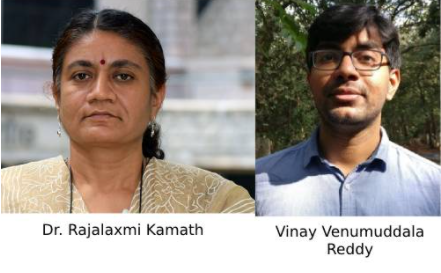INDIAN IT-BPM SECTOR NEEDS TO RESTRUCTURE PROCESSES TO BRIDGE THE ‘CORE VS IT’ DIVIDE
– Prof Rajalaxmi Kamath & Vinay Venumuddala Reddy
Today, the Indian IT sector is recruiting engineers purely for their potential to become generic software programmers. This needs to change if Indian IT-BPM sector wants to cater to specialised demands of their customers

The Indian IT-BPM sector, with its four-decade-long journey of providing Information Technology (IT) and Business Process Management (BPM) services to clients across the globe, is now at the cusp of the fourth industrial revolution (or industry 4.0). It is now dealing with emerging technologies such as artificial intelligence (AI), big data, and cloud. In this new phase of industrial transformation, firms across industrial sectors are making efforts to digitally transform their business operations to become flexible to changing customer expectations and resilient to unplanned disruptions. From its position as a leading IT-BPM service provider, the Indian IT-BPM sector is looking at an opportune moment where it can cater to the emerging technology needs of its clients that hail from diverse industry verticals. This sector—the largest private-sector employer in India—recruits a large number of engineering graduates across domain specialisations from engineering colleges across the country. As the boundaries between industrial sectors and/or academic disciplines erode, we believe this sector has a vital role in matching the industry needs through a meaningful utilisation of a skilled engineering workforce.
Today, the Indian IT sector is recruiting engineers purely for their potential to become generic software programmers, adaptable to changing tools and platforms. Substantive domain knowledge, particularly of engineers from non-Computer Science (CS) backgrounds, is hardly utilised by this industry. A key reason for this is the massive process-standardisation in IT-BPM projects to attract clients. On-the-job training programmes mould engineers—irrespective of their specialisations—into software engineers, absorbing them in these ongoing projects. Recruitment is done in large numbers to overcome attrition issues. A reserve pool of engineers is maintained to pull them into client projects whenever needed. Engineering colleges have responded by building organisational structures facilitating placements in the IT sector, relative to other industrial sectors—the well known ‘core’ vs. ‘IT’ divide in placements. However, with emerging technologies attracting a significant number of jobs, mainly from the Indian IT sector, there is some promise for non-IT engineers to transpose their specialised engineering skills.

The emerging technology solutions that the Indian IT sector is gearing to provide is different from what IT giants such as Google, Amazon, Microsoft, and others offer. While they build generic products and platforms in the emerging technology space, the Indian IT sector—an outsourcing-services-dominated industry—is placed in a niche position to deliver emerging technology solutions customised or tailor-made for its long-standing clients. Clients from verticals like logistics, healthcare, retail, banking and finance, automobile, construction, aerospace, and so on are now looking to this sector to address their digital transformation needs. Compared to the traditional IT-BPM projects, emerging technology projects provide better opportunities for engineers from non-IT specialisations. This is because emerging technology solutions, for example, AI, require expertise lying at the intersection of CS, mathematics/statistics, and relevant domain knowledge. Non-IT engineers working in industry-specific emerging technology projects can use skills from their own respective engineering backgrounds to improve the accuracy of problem description, reduce the burden of data collection, and improve the model evaluation and interpretation. Therefore, for the Indian IT sector, this is an opportunity to meaningfully engage with non-IT engineers beyond the usual software project requirements.
But for this to become a reality, there needs to be a structural change within the Indian IT sector. Despite venturing into emerging technology space, the extant process workflows within the Indian IT sector are still moulding engineers into generic software programmers. These workflows, aligned with traditional software development, mainly aim at fine-tuning the division of tasks so that engineers can independently work in distributed teams and their contribution is duly accounted for. However, such workflows are not suitable for emerging technology projects where tasks are far more entangled and clear division of tasks is difficult. In our research, we observe that beginner roles in the emerging technology space (the data-engineers), despite being recruited for their specialised data science and other non-IT skill sets, continue to work with existing software development workflows. Placed at the bottom of the hierarchy, their work context is heavily influenced by the software project management expectations. Unlike those in senior roles, who are closer to understanding the client’s firm or industry-specific use-cases, data engineers are unable to see through the AI use-cases, therby significantly eroding their contribution. They continue to work with the usual model or artefact-centred collaboration in software development where the high-level architecture specifications following modularity, customizability, and reusability of software programs dictate the assignment of tasks. But collaboration in emerging technology projects, like AI, requires iterative experimentation centred around the client’s firm and industry-specific use case. We believe that for the non-IT engineers to substantively transpose their core engineering skills in their work, there is a dire need to relook process workflows in the IT sector. Greater use-case-centred collaboration is required to effectively exploit the skills offered by the non-IT engineers, particularly in their beginner roles. Given appropriate work systems, non-IT engineers can play a significant role and shape innovation in the Indian IT industry.
*Rajalaxmi Kamath is an Associate Professor and Vinay V. Reddy is a PhD student at the Centre for Public Policy, IIMB. They are currently involved in writing up ethnographic findings in a AI Research Unit of an IT Organisation in Bengaluru.
Source: Forbes India


